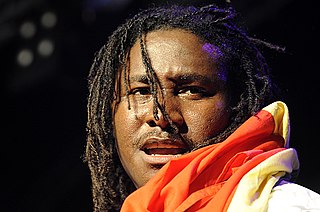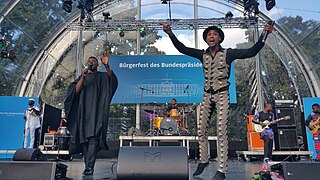
Claude Honoré M'Barali, professionally known as MC Solaar, is a French rapper of Senegalese and Chadian origin. He is one of France's most famous and influential hip hop artists. Some consider him the best French rapper of all time.
Hip hop music has been popular in Africa since the early 1980s due to widespread African American influence. In 1985, hip hop reached Senegal, a French-speaking country in West Africa. Some of the first Senegalese rappers were Munyaradzi Nhidza Lida, M.C. Solaar, and Positive Black Soul.

Senegal's music is best known abroad due to the popularity of mbalax, a development of conservative music from different ethnic groups and sabar drumming popularized internationally by Youssou N'Dour.

Baaba Maal is a Senegalese singer and guitarist born in Podor, on the Senegal River. In addition to acoustic guitar, he also plays percussion. He has released several albums, both for independent and major labels. In July 2003, he was made a UNDP Youth Emissary.
Senegalese hip hop is a form of hip hop that originated in Senegal in the early 1980s. When hip hop first hit the scene in Africa, it went from merely being a fad, to a more social and political movement. Amongst the most influential leaders of this movement were artists from the country of Senegal. With the modernization of the country, and the rise in media, the youth of Senegal were able to embrace a new form of expression.

Daara J are a Senegalese rap duo that consists of N'Dongo D and Faada Freddy. Their music takes influence from hip hop, Afro-Cuban rhythms, and reggae and is performed in English, French, Spanish, and Wolof.

Positive Black Soul is a hip hop group based in Dakar, Senegal, one of the first such collectives in the country. Founded in 1989, the group is composed of Didier Sourou Awadi and Amadou Barry, both of whom had previously been in other hip hop groups. They perform in the English, French, and Wolof languages and use traditional Senegalese instruments as part of their songs. Political and social activism have played important roles in the group since it was founded.

Viviane is a Senegalese pop singer who is the former backing vocalist and former sister-in-law of Youssou N'Dour. Viviane is known as the queen or reine of Senegalese music. Her music combines traditional Senegalese mbalax music with elements of U.S. rap, R&B and Country music. She released her first album in 1999 and formed a group called Le Jolof Band in 2001. Most of her songs are in either Wolof or English though a few are in French, the official language of Senegal. On March 31, 2012 the label Wonda Music of producer Jerry 'Wonder' Duplessis signed her to his recording label. Since then, Viviane has been working with Jerry Wonda and her album was released in 2015.

Didier Awadi is a Senegalese rapper and a significant figure in Francophone West African hip hop. As a founding member of Positive Black Soul (PBS) with Duggy Tee, Awadi toured around the world contributing to the international popularity of Hip Hop Galsen. Awadi works as a solo artist, accompanied by his crew PBS Radikal. He participates in the Senegalese music industry through his label, recording studio, and rehearsal space, Studio Sankara. Awadi offers a conscious and revolutionary style of music strengthened by articulated and rooted messages. His motivation and inspiration is grounded in the Burkinabé revolutionary Thomas Sankara's phrase: "Let's dare to invent our future!"

Negrissim' is a hip hop crew from Cameroon formerly based in Dakar, Senegal, despite their members travelling regularly between Europe and Africa.
The Gambian hip hop scene is a relatively new scene in African hip hop which developed in the mid-1990s and was heavily influenced by American hip hop and Senegalese hip hop. Gambian hip-hop has been heavily influenced by international music scene including worldbeat, Senegalese wolof music, and American hip hop, as well as traditional Gambian mbalax and n'daga music. Dominican merengue and Jamaican reggae, ragga, and dancehall have also influenced the development of Gambian hip-hop.
Lord Alajiman is a Senegalese hip hop artist and entrepreneur. He is one of the member of the now internationally known group Daara J with whom he performed and toured throughout the world until 2008 when the group split. Since then, Alajiman evolves in a solo career while contributing to the development of the music sector in Senegal. In 2009, he created Baatine Agency, a communication agency centred on Karbone 14, which repeatedly organised the shows of Morgan Heritage in Dakar. Citing Cheikh Anta Diop, Alajiman claims to understands the development – one oneself or a sector in general – as ”the acceptance of new elements”.
ALIF is the pioneer female hip hop trio of Hip Hop Galsen. Emerging in the late mid-1990s, ALIF offered a feminine and feminist flavour to Hip Hop Galsen encouraging women to play their part in the movement. The group split beginning of 2010 after thirteen years.
Gee Bayss is one of the pioneer DJs in West Africa. Member of the group, Pee Froiss, he toured throughout the world with his sure-fire turntablism which had crowds jumping whenever the group was performing. Combining solo projects with international tours of the Pee Froiss, Gee Bayss is actively engaged in transmitting his deejaying art to the younger generations.
Keyti is one of the first and most prominent hardcore hip hop artists in Senegal. With his group Rap’Adio, he offered a radical approach to Hip Hop Galsen violently recalling the initial purpose of hip hop as a means to denounce society’s flaws. Still radically critical, though less hardcore, Keyti now evolves in solo. He is part of the West African hip hop collective AURA and performs in its well-known musical comedy The Extraordinary Stories of Poto-Poto Children.
Matador is one of the most prominent figures of underground Hip Hop in Senegal. Founding member of the Thiaroye’s group, WA BMG 44, Matador has toured throughout the world gaining an international recognition from the underground hip hop scenes abroad. Since 2006, his struggle to represent the voiceless youth of his home country has taken a renewed turn with the creation of his structure, Africulturban in Pikine. Through this space dedicated to the youth, Matador reiterates his social and political engagement while pursuing his role of “Number One System Enemy” and “General Major Chief of the Dying People Army”.

Following an historical process of appropriation of American popular music by Senegal, hip hop emerged in the Senegalese capital city in the early mid- 1980s. Although hip hop galsen is now famous for its diverse musical productions, the movement there spread out from its dancing appeal rather than from its musical one. Indeed, Senegalese hip hop artists initially participated in this movement as smurfer, breakdancer, B-boy in general performing during organised podiums. Schools, nightclubs and other temporary public stages thus played an essential role in amplifying this movement in Dakar. Besides, and in contrast to American hip hop, which grew from the youth in the inner city ghettos, hip hop in Dakar began among a somehow middle-class youth who was able to access and/or introduce in their home place new ideas and new cultural expressions coming from abroad. Indeed, hip hop became popular in the capital city through the intensive through informal circulation of VH7 cassettes and recorded videos, which were imported from USA or France by diaspora people.

Bantu is a 13-piece band based in Lagos, Nigeria. Their music is a fusion of Afrofunk, Afrobeat, highlife and Yoruba music. The group features multi-instrumentalists and singers who perform as a collective.

Wagëblë are a Senegalese hip hop act. Their debut album was released in 2003.
Fatou Bintou Kandé Senghor is a Senegalese film director, writer, and photographer.











